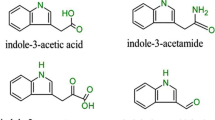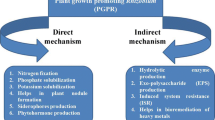Abstract
Chemical fertilizers impart deleterious effects on crop productivity and its nutrients which is a serious concern among agriculturist. Current research focuses on the commercial preparation of an eco-friendly and cost-effective bioformulation using buffalo dung slurry and beneficial plant growth-promoting (PGP) and biofilm forming strains. 40 strains were isolated from buffalo dung showing PGP activities. Among them, 03 strains were further selected to sequence by 16S rRNA technology and identified as Pseudomonas aeruginosa BUFF12, Proteus mirabilis BUFF14, Enterobacter xiangfangensis BUFF38. The strains were used for consortium preparation on the basis of increase in PGP activity. The consortium of strains increases in vitro PGP attributes at different percentage, i.e., 22% increase in IAA production, 10% increase in siderophore production, 5% increase in P- solubilization, 8% increase in K- solubilization, and 11% increase in S-oxidation. Three carrier materials, i.e., molasses of sugarcane, rice gruel, and buffalo dung slurry, were chosen to conduct the study. Among them, dung slurry proved to be an effective supportive material on the basis of their physico-chemical analysis and viability of strains for long-term storage. It maintained the population mixture of strains (9.4 × 108 cfu/ml) for 120 DAI followed by molasses (9.1 × 108 cfu/ml) and rice gruel (7.9 × 108 cfu/ml). These beneficial strains were further applied in field for crop productivity and slurry-based formulation with mixture of strains exhibited incredible plant growth after definite interval of time. Chemotactic activity proved these strains as strong root colonizers which was confirmed by Field Emission Scanning Electron Microscopy (FE-SEM). This research disseminates a successful technology to develop an eco-friendly bioformulation of buffalo dung slurry augmenting the crop growth in an eco-friendly manner leading to sustainable agriculture.






Similar content being viewed by others
Data availability
Raw sequencing reads have been deposited into National Center for Biotechnology Information and with accession numbers MH375412, MG738216, and MK835666.
References
Ansari FA, Ahmad I (2018) Biofilm development, plant growth promoting traits and rhizosphere colonization by Pseudomonas entomophila FAP1: a promising PGPR. Adv Microbiol 8(03):235. https://doi.org/10.4236/aim.2018.83016
Arora NK, Mishra J (2016) Prospecting the roles of metabolites and additives in future bioformulations for sustainable agriculture. App Soil Ecol 107:405–407. https://doi.org/10.1016/j.apsoil.2016.05.020
Arora NK, Mehnaz S, Balestrini R (2016) Bioformulations: for sustainable agriculture. Springer, New Delhi, pp 1–283
Avers CJ, Goodwin RH (1956) Studies on roots IV. Effects of coumarin and scopoletin on the standard root growth patterns of Phleum pratense. Am j Bot 43:612–620. https://doi.org/10.2307/2438877
Bais HP, Weir TL, Perry LG, Gilroy S, Vivanco JM (2006) The role of root exudates in rhizosphere interactions with plants and other organisms. Ann Rev Plant Biol 57:233–266. https://doi.org/10.1134/S0003683819080027
Baliyan N, Dhiman S, Dheeman S, Kumar S, Arora NK, Maheshwari DK (2021a) Optimization of gibberellic acid production in endophytic Bacillus cereus using response surface methodology and its use as plant growth regulator in chickpea. J Plant Growth Regul. https://doi.org/10.1007/s00344-021-10492-2
Baliyan N, Dhiman S, Dheeman S, Kumar S, Maheshwari DK (2021b) Optimization of indole-3-acetic acid using response surface methodology and its effect on vegetative growth of chickpea. Rhizosphere 17:100321. https://doi.org/10.1016/j.rhisph.2021.100321
Bashan Y (1998) Inoculants of plant growth promoting bacteria for use in agriculture. Biotechnol Adv 16:729–770. https://doi.org/10.1146/annurev.arplant.57.032905.105159
Beneduzi A, Ambrosini A, Passaglia LM (2012) Plant growth-promoting rhizobacteria (PGPR): their potential as antagonists and biocontrol agents. Gen Mol Boil 35(4):1044–1051
Choudhary DK, Varma A, Tuteja N (2016) Plant-microbe interaction: an approach to sustainable agriculture. Springer, Singapore. https://doi.org/10.1007/978-981-10-2854-0
Dheeman S, Maheshwari DK, Baliyan N (2017) Bacterial endophytes for ecological intensification of agriculture. Endophytes: biology and biotechnology. Springer, Cham, pp 193–231. https://doi.org/10.1007/978-3-319-66541-2_9
Dheeman S, Baliyan N, Dubey RC, Maheshwari DK, Kumar S, Chen L (2020) Combined effects of rhizo-competitive rhizosphere and non-rhizosphere Bacillus in plant growth promotion and yield improvement of Eleusine coracana (Ragi). Can J Microbiol 66(2):111–124. https://doi.org/10.1139/cjm-2019-0103
Dhiman S, Dubey RC, Maheshwari DK, Kumar S (2019) Sulfur-oxidizing buffalo dung bacteria enhance growth and yield of Foeniculum vulgare Mill. Can J Microbiol 65(999):1–10. https://doi.org/10.1139/cjm-2018-0476
Dhiman S, Baliyan N, Maheshwari DK (2020) Buffalo dung-inhabiting bacteria enhance the nutrient enrichment of soil and proximate contents of Foeniculum vulgare Mill. Arch Microbiol. https://doi.org/10.1007/s00203-020-01969-x
Djordjevic D, Wiedmann M, McLandsborough LA (2002) Microtiter plate assay for assessment of Listeria monocytogenes biofilm formation. App Env Microbiol 68(6):29502958. https://doi.org/10.1128/AEM.68.6.2950-2958.2002
Dubey P, Gupta GP (2012) Synergistic and antagonistic interactions among endophytic bacterial isolates of Vigna mungo (L.) Hepper. J Curr Persp App Microbiol 1:1–10
Glick BR, Patten MCL, Holguin G, Penrose DM (1999) Biochemical and Genetic Mechanism Used by Plant Growth Promoting Bacteria. Imperial College Press, London, UK
Grover S, Malik CP, Hora A, Kushwaha HB (2013) Botany, cultivation, chemical constituents and genetic diversity in fennel (Foeniculum vulgare Mill): a review. LS: Int J Life Sci 2(2):128–139. https://doi.org/10.1007/s12010-015-1593-3
Ipek M, Pirlak L, Esitken A, Figen Dönmez M, Turan M, Sahin F (2014) Plant growth-promoting rhizobacteria (PGPR) increase yield, growth and nutrition of strawberry under high-calcareous soil conditions. J Plant Nut 37(7):990–1001. https://doi.org/10.1080/01904167.2014.881857
Jha Y, Subramanian RB (2013) Paddy plants inoculated with PGPR show better growth physiology and nutrient content under saline condition. Chilean J Agric Res 73(3):213–219. https://doi.org/10.4067/S0718-58392013000300002
Kaur A, Devi SR, Vyas P (2018) Stress-tolerant antagonistic plant growth-promoting rhizobacteria from Zea mays. J Plant Prot Res 58(2):115–123. https://doi.org/10.24425/119127
Lopez-de-Victoria G, Lovell CR (1993) Chemotaxis of Azospirillum species to aromatic compounds. Appl Env Microbiol 59(9):2951–2955. https://doi.org/10.1128/aem.59.9.2951-2955.1993
Maciag T, Krzyzanowska DM, Jafra S, Siwinska J, Czajkowski R (2020) The Great Five—an artificial bacterial consortium with antagonistic activity towards Pectobacterium spp. and Dickeya spp.: formulation, shelf life, and the ability to prevent soft rot of potato in storage. Appl Microbiol Biotechnol. https://doi.org/10.1007/s00253-020-10550-x
Maheshwari DK, Dubey RC, Agarwal M, Dheeman S, Aeron A, Bajpai VK (2015) Carrier based formulations of biocoenotic consortia of disease suppressive Pseudomonas aeruginosa KRP1 and Bacillus licheniformis KRB1. Ecol Eng 81:272–277
Mishra J, Arora NK (2016) Bioformulations for plant growth promotion and combating phytopathogens: A sustainable approach. Bioformulations: for Sustainable Agriculture. Springer, New Delhi, pp 3–33. https://doi.org/10.1007/978-81-322-2779-3_1
Noirot-Gros MF, Shinde S, Larsen PE, Zerbs S, Korajczyk PJ, Kemner KM, Noirot PH (2018) Dynamics of aspen roots colonization by pseudomonads reveals strain-specific and mycorrhizal-specific patterns of biofilm formation. Front Microbiol 9:853. https://doi.org/10.3389/fmicb.2018.00853
Pahari A, Pradhan A, Maity S, Mishra BB (2017) Carrier based formulation of plant growth promoting Bacillus species and their effect on different crop plants. Int J Curr Microbiol App Sci 6(5):379–385. https://doi.org/10.20546/ijcmas.2017.605.043
Pattnaik S, Dash D, Mohapatra S, Pattnaik M, Marandi AK, Das S, Samantaray DP (2020) Improvement of rice plant productivity by native Cr (VI) reducing and plant growth promoting soil bacteria Enterobacter cloacae. Chemosphere 240:124895. https://doi.org/10.1016/j.chemosphere.2019.124895
Pérez-Rodriguez MM, Pontin M, Lipinski V, Bottini R, Piccoli P, Cohen AC (2020) Pseudomonas fluorescens and Azospirillum brasilense increase yield and fruit quality of tomato under field conditions. J Soil Sci Plant Nut. https://doi.org/10.1007/s42729-020-00233-x
Pierson EA, Weller DM (1994) Use of mixtures of fluorescent pseudomonads to suppress take-all and improve the growth of wheat. Phytopathol 84:940–941
Primo ED, Cossovich S, Giordano W (2019) A simple method to evaluate biofilm formation in exopolysaccharide-producing strains of Sinorhizobium meliloti. J Biol Edu 54(4):1–8. https://doi.org/10.1080/00219266.2019.1575268
Purwantisari S, Parman S, Budihardjo K (2019) The growth and the production of potato plant supplemented by plant growth promoting rhizobacteria (PGPR). In J Physics Conf Series 1217(1):012144
Rahmoune B, Morsli A, Khelifi-Slaoui M, Khelifi L, Strueh A, Erban A, Van Dongen JT (2017) Isolation and characterization of three new PGPR and their effects on the growth of Arabidopsis and Datura plants. J Plant Int 12(1):1–6. https://doi.org/10.1080/17429145.2016.1269215
Sahai P, Chandra R (2011) Performance of liquid and carrier-based inoculants of Mesorhizobium ciceri and PGPR (Pseudomonas diminuta) in chickpea (Cicer arietinum L.) on nodulation, yield and soil properties. J Ind Soc Soil Sci 59(3):263–267
Sahu PK, Singh DP, Prabha R, Meena KK, Abhilash PC (2019) Connecting microbial capabilities with the soil and plant health: options for agricultural sustainability. Ecol Ind 105:601–612. https://doi.org/10.1016/j.ecolind.2018.05.084
Sampedro I, Pérez-Mendoza D, Toral L, Palacios E, Arriagada C, Llamas I (2020) Effects of halophyte root exudates and their components on chemotaxis, biofilm formation and colonization of the halophilic bacterium Halomonas Anticariensis FP35T. Microorganisms 8(4):575. https://doi.org/10.3390/microorganisms8040575
Shaikh SS, Sayyed RZ (2015) Role of plant growth-promoting rhizobacteria and their formulation in biocontrol of plant diseases. Plant microbes symbiosis: applied facets. Springer, New Delhi, pp 337–351. https://doi.org/10.1007/978-81-322-2068-8_18
Shariati S, Alikhani HA, Pourbabaei A (2013) Application of vermicompost as a carrier of phosphate solubilizing bacteria (Pseudomonas fluorescens) in increase growth parameters of maize. Int J Agr Plant Prod 4:8–10. http://www.ijappjournal.com/2013-4-8/
Sheteiwy MS, Abd Elgawad H, Xiong YC, Macovei A, Brestic M, Skalicky M, El-Sawah AM (2021) Inoculation with Bacillus amyloliquefaciens and mycorrhiza confers tolerance to drought stress and improve seed yield and quality of soybean plant. Physiol Plant 172(4):2153–2169. https://doi.org/10.1111/ppl.13454
Silva-e-Costa JDC, Luizi-Ponzo AP, Resende CFD, Peixoto PHP (2017) Spore germination, early development and some notes on the effects of in vitro culture medium on Frullania ericoides (Nees) Mont. (Frullaniaceae, Marchantiophyta). Acta Botanica Brasilica 31(1):19–28. https://doi.org/10.1590/0102-33062016abb0336
Srivastava R, Aragno M, Sharma AK (2010) Cow dung extract: a medium for the growth of pseudomonads enhancing their efficiency as biofertilizer and biocontrol agent in rice. Ind J Microbiol 50(3):349–354. https://doi.org/10.1007/s12088-010-0032-y
Stephens J, Rask H (2000) Inoculant production and formulation. Field Crops Res 65(2):249–258. https://doi.org/10.1016/S0378-4290(99)00090-8
Sun D, Hale L, Crowley D (2016) Nutrient supplementation of pinewood biochar for use as a bacterial inoculum carrier. Biol Fert Soils 52(4):515–522. https://doi.org/10.1007/s00374-016-1093-9
Tewari S, Pooniya V, Sharma S (2020) Next generation bioformulation prepared by amalgamating Bradyrhizobium, cell free culture supernatant, and exopolysaccharides enhances the indigenous rhizospheric rhizobial population, nodulation, and productivity of pigeon pea. App Soil Ecol 147:103363. https://doi.org/10.1016/j.apsoil.2019.103363
Trivedi P, Pandey A, Palni LMS (2012) Bacterial inoculants for field applications under mountain ecosystem: present initiatives and future prospects. Bacteria in agrobiology: Plant probiotics. Springer, Berlin, Heidelberg, pp 15–44. https://doi.org/10.1007/978-3-642-27515-9_2
Wilhelm S (1998) Fungal diseases of the root and crown. Compendium of Strawberry Diseases, Second Edition. Ed. JL Maas 44–46
Yuan J, Raza W, Shen Q (2018) Root exudates dominate the colonization of pathogen and plant growth-promoting rhizobacteria. Root Biology. Springer, Cham, pp 167–180. https://doi.org/10.1007/978-3-319-75910-4_6
Zhang D, Pan X, Mostofa KM, Chen X, Mu G, Wu F, Fu Q (2010) Complexation between Hg (II) and biofilm extracellular polymeric substances: an application of fluorescence spectroscopy. J Haz Mat 175(1–3):359–365. https://doi.org/10.1016/j.jhazmat.2009.10.011
Acknowledgements
The authors sincerely thank to the department of botany and microbiology for providing all the necessary facilities and permission to conduct the research.
Author information
Authors and Affiliations
Contributions
SD: designed, performed the experiments, and wrote the manuscript. NB: helped in data interpretation and writing. DKM: corrected and finalized the manuscript.
Corresponding author
Ethics declarations
Conflict of interest
The authors declare that there are no conflicts of interest.
Research involving human participants and/or animals
Our research does not involve either humans or animals.
Informed consent
All authors have given their consent for publication.
Rights and permissions
Springer Nature or its licensor holds exclusive rights to this article under a publishing agreement with the author(s) or other rightsholder(s); author self-archiving of the accepted manuscript version of this article is solely governed by the terms of such publishing agreement and applicable law.
About this article
Cite this article
Dhiman, S., Baliyan, N. & Maheshwari, D.K. Appraisal of biofilm forming bacteria in developing buffalo dung-based bioformulation coupled to promote yield of Foeniculum vulgare Mill. 3 Biotech 12, 234 (2022). https://doi.org/10.1007/s13205-022-03308-x
Received:
Accepted:
Published:
DOI: https://doi.org/10.1007/s13205-022-03308-x




